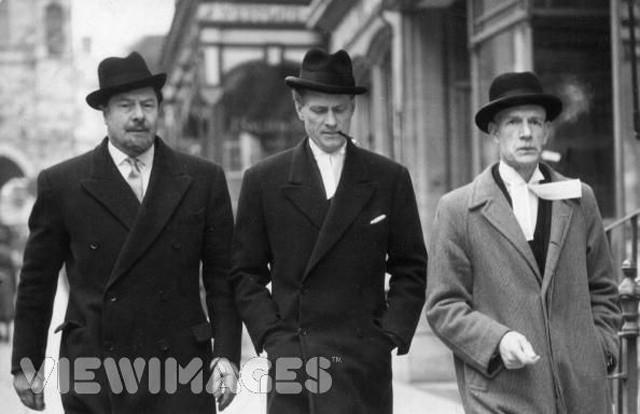I want to start with a little history. I think it is necessary.
On a cold Saturday morning in 1954, Peter Wildeblood stood in the dock at Lymington Magistrates Court in southern England charged with “conspiracy to incite certain male persons to commit serious offences with male persons”.
In short order, the diplomatic correspondent of The Daily Mail was convicted and sentenced to 18 months in jail. Thus did that great newspaper play an important role in legalising homosexuality.
For the jailing of the Mail’s man, and his friends Lord Montagu and Michael Pitt-Rivers, produced an outcry.
As occasionally happens in politics, this prosecution suddenly revealed a great injustice that had been there all the time, unnoticed.
The home secretary responded by setting up a commission under Lord Wolfenden that, when it finally reported in 1957, recommended homosexual acts should no longer be illegal.
Yet it took 10 years before this happened.
It needed a Labour government, great ingenuity by its home secretary, Roy Jenkins, in the mid-1960s and huge rows in cabinet before government time was found for the House of Commons to debate and agree on legalising homosexuality.
I start with history for three reasons.
The first is that while some argue gay rights has been an onrushing tide, brooking little opposition, insisting “we” bow to political correctness dictated by “them”, the truth is progress has been very slow.
Decades have passed between the recognition of injustice and its correction.
The second is that the history of the suffering of gay people – of jailing, police intimidation, discrimination and street violence against them – and the story of the long and difficult struggle for gay rights illustrates that this is for us in England the great civil rights cause of our lifetime.
Finally, I start with history because I fear it shows that the role of the Conservatives in advancing this civil rights cause has not been glorious.
Tories ended slavery, championed the Factory Acts, broadened the franchise and brought equal votes for women. But in 1967 almost all Tories either voted against legalisation or stayed away.
Now, in office, the Conservatives have an opportunity to make their contribution to a cause they so long spurned.
The Liberal Democrats are advancing the idea that gay couples should be allowed to marry in religious establishments.
Conservatives in the government should champion this proposal and not merely tolerate it, for it is a profoundly conservative idea that gays should marry.
What, after all, is conservatism? It is an attempt to distinguish between social customs and fashions that can change, and fundamental ideas and institutions that define a community and therefore must be preserved.
Conservatives get stuck when they muddle up the two, when they, for instance, begin to regard a particular form of dress (a tie, a dinner jacket) as a point of principle.
The best Conservatives are those who see the distinction most clearly and who, like Benjamin Disraeli, are able to make great leaps of imagination, broadening the franchise to a new middle class to preserve a stable nation of property holders.
Being able to tell the difference between changing customs and fundamental institutions requires Conservatives to be acutely aware of how society is evolving, sensitive to developments and trends. Fogeyism is bad conservatism.
It misses the point.
Conservatives will often be late to champion reform, as they cautiously weigh up whether change might undermine fundamental liberties or the character of the nation. Yet once they have made up their mind, they should move boldly and firmly.
When civil partnerships were first suggested, the idea was advanced that providing legal status for gay couples might undermine heterosexual marriage.
The means by which this would happen were obscure, but whether or not this was ever a sensible argument, it is apparent the fear is groundless.
The opposite point should recommend itself to Tories.
Marriage strengthens commitment between couples and therefore brings stability into the lives of those who enter in it.
The advantage of extending that to gay people is obvious.
Nevertheless, there is an objection that the difference between marriage and gay civil partnership should be maintained, because marriage is intended for procreation.
Another odd argument.
Lots of people marry when they don’t intend to have children, cannot have children or are too old to do so. Should these people be forced to have civil partnerships?
Against this is the important fact – that to deny gay people the right to marry in the full sense is to deny people the dignity and respect they deserve. And who better than a Conservative can understand the desire of an individual for dignity, respect and social status?
What, finally, of the religious objection? I am not very good at praying. My wife complains I fidget in synagogue. The children complain I fidget.
But for all my failings in the devotion department, I do have one conviction about prayer of which I feel confident.
It would be very disappointing for the Jews to have prayed for thousands of years and learned nothing.
Sometimes you have to sit there for hours. Surely some thoughts must have struck us in all that time.
For me, that thought is a steady, strong belief in the fundamental equality before the law and under God of my fellow humans and a determination to love what is different about them as well as the things I share.
I do not expect, or demand, that all others share it, but I am as sure as I can be that this belongs in my religion. I would want Conservatives to champion my free expression of this religious belief.
Author: Daniel Finkelstein
Publication: The Times
Date: 18 Feb 2011

